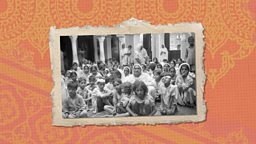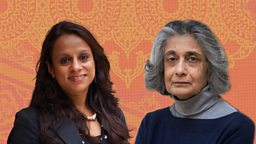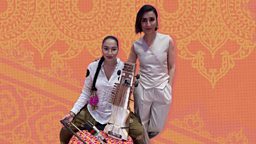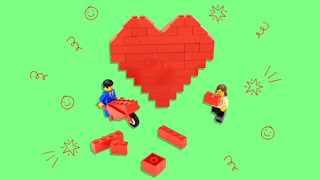Six things we learnt from Woman’s Hour’s Partition of India special programme

To commemorate the 75th Anniversary of the Partition of India, ����ý Radio 4’s Woman’s Hour dedicated the entire programme to hearing about the forgotten women of Partition.
In August 1947, independence was granted to India, ending 200 years of British rule. A line was drawn that split the country in two – India and West and East Pakistan, which later became Pakistan and Bangladesh.
It was the largest mass migration movement of the time, with 15 million people becoming refugees in their own land overnight. Up to a million people lost their lives. This is something very close to Woman’s Hour presenter Anita Rani’s heart. Her grandfather lost his entire family during Partition.
“For me, when I heard what happened in my own family and to women, it fundamentally changed who I am and decisions I've made consequently,” says Anita. “The stories of what happened to women in history are rarely spoken about and no-one talks about Partition.
“It’s only now that we’re having these conversations because grandchildren want to know what their grandparents went through. So, what better space to discuss the story of the horrific violence towards women during Partition and the impact it has on their granddaughters, than Woman’s Hour.”
Keep reading for six things we learnt from the special edition of ����ý Radio 4’s Woman’s Hour.
Warning: Readers may find the content of this article distressing.
1. The history of women in Partition is often forgotten
“There are so many stories of Partition. So often, the ones that are prioritised are ones that happened to and are told by men. Yet so often women's bodies are the site of such deep, horrific trauma”, poet and writer Fatimah Asghar told Anita.
“When we think about women, and specifically when we talk about Partition, we're talking about really high numbers of rape, we're talking about really high numbers of women who were stolen from their families, we're talking about high numbers of honour killings, just very specific gendered violence.”
“Violence takes on a very intimate form,” says Shruti Kapila, Professor of Indian History at Cambridge University. “It’s precisely because women are perceived and seen to have all the elements of nationalism, the repository of the nation, the family, the religion, that they become such a potent symbol, not just for deification, but then for destruction.”

2. We heard one listener’s direct experience of Partition
Listener Amayna got in touch to share her mother Saghira’s story. She was around 14 years old when Partition happened. In a voice note, Saghira took us back to 1947 and recalled how her father tried to prepare her and her siblings should any of her family be attacked and end up being abducted or raped.
“It was quite fearful. We had to always be ready to run away from home if they started doing the bombardment by air raid. So, we were ready for everything. We had a belt and key for small personal things, and a toothbrush, some food, a small covering blanket.
“These were India and Pakistan, treating each other like animals. The women were raped. Young girls, they would take them and get disappeared. So, when the siren went, our father explained to us that if the situation came that they kidnapped us or raped us, he would use the revolver and he would kill us for the sake of our honour.”
3. There is still a lot of silence around what happened to women during Partition
Ritu Menon is a feminist writer and author of Borders & Boundaries: Women in India’s Partition. She started to collect oral histories of women in Partition in 1984.
“When we started researching, we weren't really looking at the violence because that's not something that had ever been part of the conversation,” says Ritu Menon. “It had never even struck us that this is what we would find.
“One of the women we met said: ‘When I was a young girl, we were told by our families to carry a vial of poison around our necks. So that should there be an occasion that we were left behind or ambushed or lost or kidnapped, we could end our lives.’ It was a very common thing. Women were used as a pawn with no choice.”
4. Open conversations about the impact of Partition are now gaining momentum
Whilst there has often been a shroud of secrecy around Partition, one episode of Marvel’s Ms. Marvel, featuring its first Muslim female superhero, has brought that period of history alive on screen. It has been praised for bringing knowledge about Partition to a wider audience. Fatimah Asghar was one of the writers on the series.
“We felt an incredible responsibility to all of the communities that we come from when crafting the Partition episode,” says Fatimah Asghar. “It was an incredible responsibility to not only our people who are living but the survivors of Partition and the people who didn't survive.
“We have an impact. I grew up not even seeing our history told in textbooks. So, you can see what we're able to do what we break silence, what we're able to do when we start to tell these stories, what we're able to do when we really commit to saying: ‘This is important to me. This is something I really want to see in the world.’
“Learning about my family, hearing my family's stories, so much tragedy, so much work to just uncover that history for yourself. The nights that you spend alone up at night researching, the nights that you spend talking to people, the nights that you spend crying on the floor when you realise what happened to your family, what happened to other families and people that look like you. To go from uncovering that history for yourself to seeing something as big as this on screen, it's incredibly humbling.”

5. Learning about family history is inspiring young South Asian women to raise their voices
Amrit Khan is a musician who has used her love for music to help raise awareness for what women went through during Partition. She has found strength in learning more about her family history.
"We talk a lot about generational trauma,” says Amrit. “We talk about the cycles and generations of pain and suffering. But at the same time, I feel like when I sing and when I compose, I draw on the generational cycles of strength and resilience and grit, and everything that's been passed down to us.
"Our generation is doing so much to break the cycles that don't nurture us. But there are so many cycles within us that can be nurtured. And that's my superpower. There's so much strength that I get from connecting with this.”
6. But there’s still lots we don’t know about what happened during Partition
“A lot of people, particularly young people who had never asked their families about Partition, were like: ‘This has made me go to my grandparents and ask them what our family story is. Now I'm getting a kind of conversation that I didn't even know existed,” says Fatimah Asghar.
“That generation won't be here for much longer,” says Dr. Binita Kane, co-founder of South Asian Heritage Month. “We have to preserve that. We have to teach children why they are here in this country. Otherwise, we are at risk of losing that history.”
“In school, when you're born and brought up in the UK, you're distracted by other things, because there's no prominence or importance placed on 1947 Partition, even though it is part of British history,” says Unzela Khan, Race and Diversity Editor for MyLondon. “But as I grew older, I felt like I needed to know my own family's Partition story, because it deserves to be told and heard.
“Myself and generations after me are taking a lot more interest in what their grandparents went through. I feel like it's just something that we now know that we need to find out more about. We need to know our family's history and carry on their legacies and what they went through. A lot of that generation won't be here to tell their story. So, it's up to us to pass it on.”
Listen to the full Partition special of ����ý Radio 4’s Woman’s Hour with Anita Rani on ����ý Sounds, where you can also catch up with any other episodes you may have missed. Follow us @bbcwomanshour on or to join the conversation.




